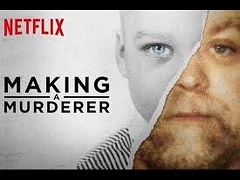New true crime binges

Last year, the grim image of a scruffy, white-bearded, expressionless man’s mugshot took social media accounts by storm.
This man, Steven Avery, is the star of a popular Netflix “docu-series” released last December. The 10 episode series, Making of a Murderer explores the 2007 conviction of both Avery and his then 16-year-old nephew Brendan Dassey. Dassey and Avery were sentenced to life in prison for the 2005 murder of 25-year-old photographer Teresa Halbach.
As the series progresses, viewers watch raw police interrogation clips and emotional family interviews. They learn all about Avery’s economic condition and social life. With every episode, the audience grows more and more skeptical of the legitimacy of the conviction, slowly losing faith in our criminal justice system.
After viewers binge-watched the series, many sparked an uproar on social media. From what they could see, Avery and Dassey were innocent and were victims of our country’s faulty judicial system. An online petition to free Steven Avery generated 500,000 signatures and was later sent to President Barack Obama.
But how could these outraged fans think that they have the authority or expertise to determine Avery’s innocence? Most have little knowledge of the justice system or the editing process of the documentary, and therefore are completely unqualified when it comes to determining and resolving an investigation.
Making of a Murderer is just one of the many series joining the “true crime” television documentary fad.
Reality television and documentary series empower the public. You can start the night lounging on the couch with a bowl of popcorn and end it as an experienced and qualified police investigator, or at least feel that way.
While this form of entertainment is beyond interesting, informative, and addicting, true crime series are doing more harm than good. Like their other reality television counterparts, true crime series portray a skewed depiction of reality. Due to the gullibility of viewers, even if unintentionally, producers can easily manipulate the audience’s opinions, as they are blind to any bias from the series. Because Making of a Murderer makes Avery and Dassey out to be victims of the judicial system, the public has grown skeptical of law enforcement as a whole. Law enforcement are supposed to protect the public; instead, people are fearing them.
Like all fads, the popularity of the investigative reality genre has grown exponentially in recent months. Along with Netflix’s Making of a Murderer, the 2014 podcast, Serial, regained its popularity in August, when the convicted criminal was approved for a retrial. In addition, MTV released its newest reality series in September, entitled Unlocking the Truth. Hosted by Ryan Ferguson, a Missouri man who spent his 20s imprisoned for a crime he didn’t commit, this series follows Ferguson as he conducts raw and real investigations of potentially innocent, convicted criminals. Viewers watch as Ferguson dives deep into these cases, most of which conclude in the criminals’ favor.
Don’t get me wrong, I absolutely believe that the legal system should be held accountable for any mistakes or oversights made during an investigative process, and if applicable, criminals should be granted a retrial. However, as much as I love the investigative reality genre, I do not see the need to televise these processes to this extent. As if recent events revolving around our judicial system haven’t already broken the public’s trust, true crime series are only contributing to the declining trust in our legal system.
